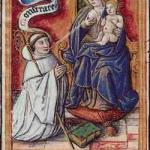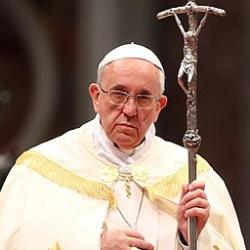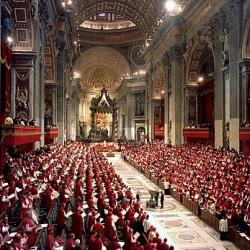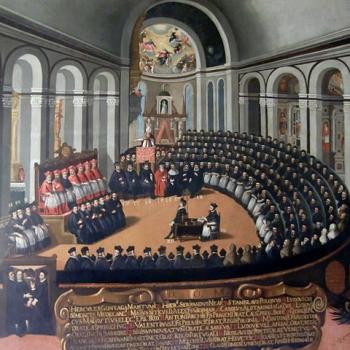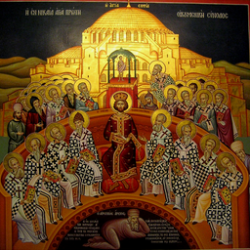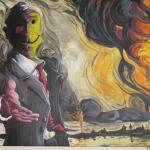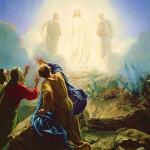
I love the fact that the Old Testament readings at Mass correspond, as a general rule, to the Gospel readings. There’s something to be said, to be sure, for the approach of the Protestant “Revised Common Lectionary,” which provides a continuous reading of the Hebrew Scriptures. For study purposes, that is of course the best method. But for Mass, I think it’s not ideal. As Catholic Christians, we read Scripture liturgically and intertextually. Scripture is a vast organ whose stops combine to produce rich harmonies. And when, as today, the Epistle reading also reinforces the same theme, the effect is powerful.
The house of my prayer
The Old Testament reading for today, from Isaiah 56, promises that foreigners who join themselves to the Lord will be brought to God’s holy mountain and will rejoice in “my house of prayer.” This is the occasion for one of my favorite bits of rabbinic interpretation. The Mishnah, the core text of the Talmud, argues that the phrase refers not to a house where we pray to God (or not only that), but to the house where God Himself prays. (In Hebrew, the possessive suffix is attached to “prayer,” not “house,” so it could be read as “house of my prayer.”)
What then does God pray? The Gemara (the commentary added to the Mishnah to create the Talmud) has an answer: “May it be my will that my mercy overcomes my anger, and that my mercy prevails over my other attributes. May I deal with my children according to the attribute of compassion; may I deal with them beyond the letter of the law.” (Law here is “din,” strict justice, not “Torah.”)
When God asked for a blessing
A second story drives home the point. Rabbi Ishmael, the High Priest, saw the Lord of Hosts on his throne and the Lord asked the High Priest for his blessing. Ishmael blesses God Himself with the same prayer that God prays, that His mercy will overcome His wrath and that he will act toward His children with mercy and not with strict justice. The modern rabbi Ari Kahn points out that in Jewish martyrology this same Rabbi Ishmael is described comforting a fellow martyr by suggesting that they might have brought this suffering on themselves by making a suppliant for justice wait even for a few moments. In other words, Kahn suggests, the same rabbi who blessed God himself with the prayer asking God to act “beyond the letter of the law” was judged according to strict justice. Kahn draws on another Talmudic passage to suggest that the Temple fell because God’s people acted according to the letter of Torah rather than “going beyond it” in mercy, as God Himself prays to do.
The idea of God praying is strange to Christians. And yet our distinctive teaching is precisely that God became incarnate as a man who often prayed to God. It’s one of the many ironies of the complicated and tragic relationship between Judaism and Christianity that our picture of God is often more distant and terrifying, less relational, than that of rabbinic Judaism. The Incarnation ought to make us understand what it means for God to pray. But instead, popular Christian piety far too often sees Jesus as the one who pays the price to reconcile us to a wrathful God of strict justice, rather than as the literal embodiment of the truth the rabbis understood so well: that God’s mercy is, by God’s own will and desire, His final word in His dealings with His creation.
The dogs and the children
In the Gospel reading, about the Syrophoenician woman, we have a dramatization of this tension between “strict justice” and divine mercy in the dialogue between Jesus and the woman. Fr. James Martin got a lot of criticism a couple of years ago for suggesting that the woman helps Jesus come to a fuller understanding of His own ministry. I’m not sure, myself, that Fr. Martin’s Christology is heretical. I think in order to maintain Jesus’ full humanity we need to be far more “kenotic” than the Christian tradition has usually been. But I’m also not sure that this is really the point here.
For one thing, I think that we should resist the temptation to read stories like this purely in terms of the modern liberal narrative of narrow tribal identity versus universal compassion. In our desire to reject some of the twisted ways in which we have interpreted divine wrath and judgment in the past, we often seek to explain all such language away. Because we have in the past twisted the Biblical language of “particularity” into a justification for racism, it’s hard for us to see anything but ethnic prejudice in a statement such as “it is not right to give the children’s bread to the dogs.”
The nations in the pit
The Jewish understanding of the dialectic between divine wrath and divine mercy may be helpful here. The nations, in the prophetic writings, are societies that serve as ministers of divine wrath and precisely by doing so bring down God’s wrath on themselves. Israel experienced them as sources of temptation and instruments of divine judgment. In my longstanding but sporadic effort to read through the Hebrew Scriptures in the original language, I recently read Ezekiel’s prophecies against the nations, including Tyre and Sidon (the culture to which this woman belonged). Ezekiel 29, in particular, is one of our sources for the concept of the fall of Satan, but it is literally referring to the king of Tyre (just as Isaiah 14 literally refers to the king of Babylon). Tyre was an “anointed cherub” in Eden, the “garden of God.” But through pride and violence and exploitative trade practices it has fallen into the “pit,” the world of the dead.
Ezekiel’s oracles against the nations culminate in chap. 32 with a lament over Egypt, depicting Pharaoh going down to the underworld and being greeted by the other great kings and warriors who are already there. In the words of the KJV: “they have all gone down to hell with the weapons of their war.” (Isaiah 14 describes the fall of Babylon in very similar terms.)
The picture of the “nations” we find in the prophets is one of endless warfare, endless strife for power, ending always in death and destruction. And for the apocalyptic writers of the Second Temple period this world of darkness and death was the result not just of bad human choices but of the work of evil spirits. Isaiah 14 and Ezekiel 29 were not, in the apocalyptic worldview, just descriptions of arrogant kings, but of heavenly beings who had rebelled against God and dragged humanity down with them in their fall.
The “other side”
Much later, in the sixteenth century, the great Jewish mystic Isaac Luria would describe the world outside Judaism (i.e., in his context, the world of Christendom and Islam) as the world of the “sitra achra”–the “other side,” evil. And he would characterize this world of evil as a world in which God’s attribute of “din”–strict justice–had somehow taken on a life of its own, unrestrained by the mercy that, in God Himself, was by God’s own prayer always dominant over it.
I know it’s anachronistic to read Luria back into the Gospels. But his thought was the culmination of a long tradition. And when Jesus tells this woman that Gentiles like her are “dogs,” we need to set our contemporary sensibilities aside and recognize that this was a prophetic judgment on the world of Gentile tyranny and violence, not simply what we would now call “ethnic prejudice.” In calling her a “dog,” Jesus is voicing “strict justice,” divine wrath. He is saying that she is part of a world consumed by the forces of evil, a world with no binding claim on the mercy of the God it has abandoned.
But that is only one side of the story–and in both Jewish and Christian traditions, not the dominant side. Indeed, paradoxically, if that is the end of the story–if strict justice is the final word–then it is not God who is speaking but a distorted, demonic shadow of God. As Paul reminds us in our Epistle lesson, God’s final purpose is to have mercy on all. It is only for that purpose that He has shut us all up under judgment.
Speaking for God
Rather than reading the Gospel story historically and psychologically, as Fr. Martin does, I think we should read it in light of the many dialogues between God and humans in the Old Testament. The Catholic scholar Gary Anderson has argued that in these dialogues, the voice of God is to be found in the dialogue as a whole. In Exodus 32, God offers to wipe Israel out and make Moses’ descendants into a great nation instead. Moses responds by pleading with God to have mercy. In that dialogue, Anderson says, it is the character “Moses” who most fully expresses God’s purposes. But God is truly revealed in both sides of the dialogue, in the dialectic of wrath and mercy.
I think this is what is going on in Matthew 15 as well. When the woman pleads for the crumbs that fall from the master’s table, she is voicing God’s prayer of which the rabbis spoke. God is speaking in her, to the God Incarnate who stands before her. This is not so much a story of ethnic prejudice overcome as a story of the divine mercy that always stands behind and beyond the true and terrifying face of divine wrath.
Like Rabbi Ishmael the High Priest, the Phoenician woman blesses God by speaking His own deepest prayer to Him. And so she becomes one of those of whom Isaiah spoke, a “foreigner” who joins herself to the Lord. She becomes one of the “lost sheep of Israel” to whom Jesus was sent. She comes to God’s holy mountain and rejoices in the house of God’s prayer, the house of God’s strange mercy.
And as the rabbis recognized, that is the only way in which anyone can achieve mercy.
Live by judgment, die by judgment
Rabbi Kahn’s suggestion that Jerusalem fell because the Jews of that time lived only by the letter of the Torah is not something we as Christians should exploit. God knows we’ve done that enough. Whatever first-century Jews did or didn’t do, we Christians have gloated over the supposed “rejection” of the Jews for centuries. We have done exactly what Paul told us not to do: we have boasted of our supposed superiority to the “natural branches” of the tree into which God has unnaturally grafted us. We have made our very doctrine of mercy into a new law to distinguish ourselves from the people of the supposedly unmerciful “Old Law.”
And so, whatever was the case for Jews in the first century, it is certain that upon us Christians of the twenty-first century judgment is coming. Indeed, it has already begun. And our only hope is to acknowledge, as Rabbi Ishmael did on his way to execution, that every time we have delayed for a second in helping the needy we have deserved this judgment.
Panting for God’s mercy
Whether we escape the fullness of judgment or not, we must pray without ceasing the prayer of God: “may God’s mercy overcome his wrath.” We must be willing to pant like dogs for the crumbs of God’s mercy. We must accept that we may well see atheists and Muslims and Wiccans and maybe even Trump voters going into God’s kingdom, and we ourselves shut out. We must take our places with the heathen who have gone down to hell, laid in the sides of the pit, awaiting the unthinkable resurrection.
And when we do that, God is praying in us. Every time we choose mercy over strict judgment, “thou” over “it,” every time we choose to see a person as “my brother or sister” rather than “that filthy sinner over there,” we are making space for God to work. In the words of Rabbi Kahn, we are helping to “create a world where the Divine Abundance flows.”
We are rejoicing in the house of God’s prayer.



